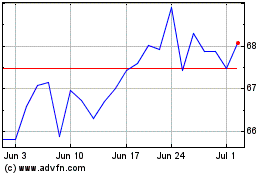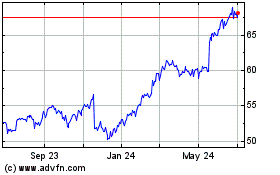Walmart to Pay $282 Million to Settle Claims of Corrupt Payments Abroad--5th Update
June 20 2019 - 6:43PM
Dow Jones News
By Dave Michaels and Sarah Nassauer
Walmart Inc. agreed to pay $282 million to resolve yearslong
criminal and regulatory investigations into whether it paid bribes
around the world, agreeing that it had lax policies in place to
catch potential corruption.
The resolution comes after more than six years of settlement
talks between Walmart and the U.S. government.
The deal requires Walmart to return $144 million in gains to the
Securities and Exchange Commission and pay a $138 million penalty
to the Justice Department. The SEC said the company's actions
violated the Foreign Corrupt Practices Act, which effectively
forbids U.S.-listed companies from paying bribes to win business
abroad.
The Justice Department began its investigation as a result of a
series of 2012 New York Times articles which described payments
Walmart made in Mexico to obtain permits to build stores there. The
probe later examined Walmart's business across the globe, including
in Brazil, China and India.
"We're pleased to resolve this matter," Walmart Chief Executive
Officer Doug McMillon said in a written statement. "We've enhanced
our policies, procedures and systems and invested tremendous
resources globally into ethics and compliance."
Two years ago Walmart said that it would record a $283 million
charge related to the settlement.
The SEC's civil order alleged that Walmart targeted global
growth during the 1990s without immediately ramping up its systems
to account for corruption risks. Walmart has spent more than $900
million since 2012 on an internal investigation of the allegations
and related compliance improvements, the company said.
Walmart's Brazilian subsidiary pleaded guilty to one count of
violating the foreign-corruption law. The Justice Department agreed
not to prosecute Walmart Inc. as long as it pays its penalty,
maintains its anticorruption compliance program and retains an
outside compliance monitor for two years.
The company sold a majority stake in its Brazilian operations
last year to a private-equity firm.
Walmart sought to wrap up the probe during the final weeks of
the Obama administration. But the company and U.S. officials
weren't able to agree on a deal, clashing over issues including
Walmart's eligibility to continue accepting food stamps in its
around 5,300 U.S. stores.
A company that pleads guilty to a federal crime can lose its
right to win government contracts. Walmart will continue to accept
Supplemental Nutrition Assistance Program benefits after reaching
an agreement with the government, said Randy Hargrove, a Walmart
spokesman.
Monitors will observe corporate anticorruption compliance
efforts at Walmart headquarters, as well as in other countries
including Argentina, Chile, Japan and South Africa, Mr. Hargrove
said.
U.S. authorities in May 2017, shortly after the beginning of the
Trump administration, sought a fine of $300 million to settle the
probe, a penalty far less than the $1 billion sought by government
enforcers toward the end of the Obama administration.
The SEC's settlement order with Walmart said the company's
"low-cost philosophy" contributed to its insufficient policies to
combat corruption risks in Brazil, India, Mexico and China. Walmart
operated in countries where intermediaries were paid to speed up
store permits and licenses, according to the SEC.
"Walmart valued international growth and cost-cutting over
compliance," said Charles Cain, chief of the SEC's foreign
corruption unit. "Walmart repeatedly failed to take red flags
seriously."
A Walmart unit in Brazil used a consultant known as the
"sorceress" or the "genie" for their success in obtaining permits
that were needed to open stores, the SEC's order alleged. Former
employees of a construction company building one store believed the
consultant was possibly a government employee. One former worker
said the consultant admitted to needing money for "people I have to
pay," the SEC's order said.
The consultant was paid about $527,000 in 2009 and 2010 to
obtain licenses and permits, the SEC alleged.
The corruption claims also spurred shareholder lawsuits.
Last year Walmart agreed to pay $160 million to settle a
long-running shareholder class-action suit brought by the City of
Pontiac General Employees' Retirement System. Walmart didn't admit
fault as part of the settlement, the company said at the time.
Write to Dave Michaels at dave.michaels@wsj.com and Sarah
Nassauer at sarah.nassauer@wsj.com
(END) Dow Jones Newswires
June 20, 2019 18:28 ET (22:28 GMT)
Copyright (c) 2019 Dow Jones & Company, Inc.
Walmart (NYSE:WMT)
Historical Stock Chart
From Mar 2024 to Apr 2024

Walmart (NYSE:WMT)
Historical Stock Chart
From Apr 2023 to Apr 2024
